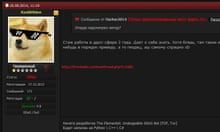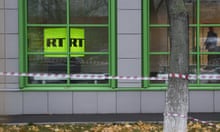Italian police have arrested two people who allegedly tried to hack the communications of former prime minister Matteo Renzi and other senior Italian politicians and business executives as part of a cyber-espionage ring that sought sensitive financial and political information.
The alleged hackers, named as Giulio Occhionero and Francesca Maria Occhionero, a brother and sister who were residents of London, also targeted the former prime minister Mario Monti; the head of the European Central Bank (ECB), Mario Draghi; Cardinal Gianfranco Ravasi, a member of the conclave that elected Pope Francis, and top officials in Italy’s tax police.
Court filings show that the hackers allegedly sought to infiltrate Renzi’s account on two dates last year – the 12 and 30 June – and that Draghi was targeted on 23 June, the day the UK voted to leave the European Union.
The suspects are also alleged to have targeted the Bank of Italy and politicians in both chambers of Italy’s parliament. Both were described in court documents as residents of London who were domiciled in Rome. Giulio was born in Italy while Francesca was born in the US.
A lawyer for Giulio Occhionero told the Financial Times that his client had not committed any illegal activity and that he owned servers in the US because he had business there. An attorney for his sister could not be reached.
Roberto Di Legami, director of the specialised cyber police unit that conducted the investigation, said the magnitude of the alleged attacks was not yet fully known, but would become clear soon. Investigators are conducting a forensic probe of the data after law enforcement officials in the US and Rome seized servers that were allegedly used by the suspects.
“We will know only after we receive the seized material from the US and at that point, through forensic activity, we will manage to put everything in place, to know who was spied on, for how long, what kind of data was stolen,” Di Legami told the Guardian.
He said at this point it was only known that multiple attempts were made to hack the account of Renzi and others.
The investigation was initiated after a security specialist became suspicious upon receiving an email from an individual purporting to be a lawyer that turned out to contain malware. He turned the matter over to the Italian police. An eight-month investigation ensued, which Di Legami said resulted in the seizure not only of servers but of so-called “drop zones” that were located throughout the US. The drop zones were virtual spaces that could be used to store information, he said.
Di Legami added that no evidence had emerged during the investigation that the information allegedly collected had been sold to a third party or used to blackmail any public officials. But he said there were strong indicators that the financial information had been used by Giulio Occhionero in order to make financial gains.
“If you ask me why he was doing it, in my experience, it would be that he was doing it for power,” Di Legami said.
Giulio Occhionero, a nuclear engineer by training, was suspected of having developed the malware the pair allegedly used to infect email accounts, which allowed him to gain access to the targets’ correspondence.
Among the evidence being examined by police are nearly 20,000 email accounts that were hacked and 2,000 email passwords.
A spokesman for Renzi’s Democratic party did not comment and the ECB declined to comment.
However, a person familiar with the matter who spoke on the condition of anonymity said there was no evidence that any ECB account had been successfully hacked. Court documents indicate that the alleged hackers targeted Draghi on a Bank of Italy email address, and Renzi through a private Apple account.
The suspects were arrested with the help of FBI officials, who are working closely with Italian authorities on the case. Police said the pair were well known in the world of high finance and had allegedly run a cyber-espionage ring for several years, targeting institutions, public administrations, professionals, politicians and entrepreneurs of “national importance”.
The FBI said in a statement that it had provided support to an Italian investigation into criminal hacking that had targeted victims in Europe and the US.
The pair are suspected of procuring information about state security, accessing computer systems unlawfully, and illegally intercepting communications and telecommunications.
They are alleged to have used malware to remotely gain access to their targets’ computer networks. The suspects allegedly chose “numerous victims” and had been able to acquire confidential information and sensitive data that they kept on US computer systems, which have since been seized by authorities with the help of the cyber division of the FBI.
The Italian police said US authorities would help determine what and how much data had been taken unlawfully. The information sought by the alleged hackers was valuable to financial interests, police added.
According to company filings and a LinkedIn profile that appears to belong to a person named Francesca Maria Occhionero, she and Giulio Occhionero co-founded a London-based company, Westlands Securities, in 2001. The company was dissolved in 2014. A description on the LinkedIn profile said it was a private company that provided financial advice to banking institutions and that it later became involved in real estate and private equity. The group also had ties to companies located in Malta and the US state of Delaware.









